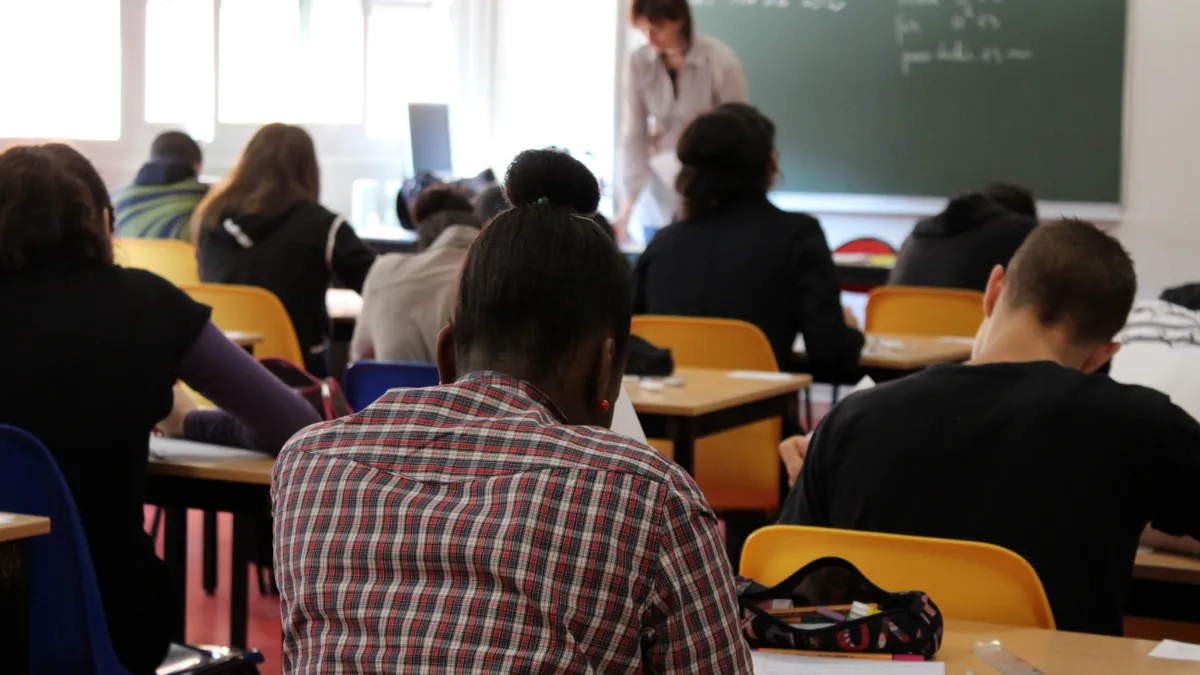2019 was a record year for advocates of the test-optional movement in college admissions. More than 50 institutions, the most in a single year, declared they would no longer require, or in some cases even review, applicants' SAT and ACT scores.
Administrators at these schools said better metrics exist for judging students' academic prowess. In some cases, their reasoning echoed arguments made by opponents of college admissions testing, who say the system is inherently biased and favors wealthy students who can afford extensive test prep and tutoring.
Now, as the coronavirus continues to hamper the higher education sector, it is exposing and exacerbating these disparities, standardized testing experts told Education Dive.
The groups that run the SAT and ACT canceled testing dates scheduled for this month through May, a critical window in which high school juniors often take the exams in time to apply for college in the fall. Already, low-income students encounter barriers to preparing and sitting for the exams, and removing test dates stands to compound their problems.
At least half a dozen colleges have announced in recent weeks that they would either waive or alter their requirements that applicants take the tests. Some were considering test-optional policies before the pandemic hit, but it has pushed up their timelines, a trend that will likely continue.
"This has magnified concerns people have about SAT and ACT being legitimate measures of academic success," Bob Schaeffer, interim executive director of the National Center for Fair and Open Testing (FairTest) and a vocal critic of admissions testing, told Education Dive.
Schaeffer said the ACT, in particular, is intended to show mastery of the high school curriculum. Because some K-12 schools have either shifted online or altogether scrapped the last few months of the academic year, he said, "it's even less of a common yardstick than it ever was."
One of the institutions that elected to remove testing requirements for students applying to enter in the summer and fall 2020 semesters is the University of Toledo, in Ohio. It was considering more flexible admissions policies for students entering in the spring of 2021, but coronavirus accelerated its plans, Jim Anderson, vice president for enrollment management, said in an interview with Education Dive.
Students applying to a few of the university's programs — nursing and engineering, for instance — will still need to take the entrance exams, Anderson said. But by and large, officials recognized that not all students would be able to take the tests, he added.
The coronavirus has "reignited the digital divide conversation," Anderson said, noting that some students can't access adequate internet connections away from school in order to prepare for the tests. High school students whose schools have closed also can't easily work with their counselors anymore, he said.
The shuttering of K-12 schools to help stem the spread of the virus has added another complication to an already troubled time in college admissions. At least 46 states have shut down schools as of Sunday, according to Education Week.
Many secondary schools are moving to online instruction, and the transition could affect students, particularly those who have limited or no internet access, or who have other responsibilities at home, such as taking care of siblings.
Some schools are trading letter grades for a pass/fail assessment, and Advanced Placement tests are being offered in a take-home format without multiple-choice questions.
All this could paint an incomplete picture of students' academic abilities. If students' records aren't consistent, and with fewer colleges mandating SAT or ACT scores, admissions officers may have a harder time evaluating students this cycle, Schaeffer said.
Even still, GPAs are a fairer and more consistent measure of students' talents than the SAT or ACT, said Jay Rosner, an expert on college testing and executive director of The Princeton Review Foundation, a nonprofit organization that helps students prepare for the tests.
Admissions professionals will still be able to review students' freshman and sophomore years, the first semester of their junior year, and presumably the first semester of their senior year, Rosner said.
Research backs Rosner's assertion. A study published in January found high school GPA was five times more accurate in predicting college graduation rates than the ACT.
"Admissions is an art, not a science, and admissions officers can do their job very well even without junior year data," Rosner said.
During this admissions cycle, U of Toledo administrators are "building the plane while we're flying it," Anderson said. Absent information about applicants' GPA and test scores, he said they might look more closely at counselor recommendations or "a student's story."
Whether colleges will continue with test-optional policies after the crisis subsides is unclear. Case Western Reserve University, a private institution in Ohio, last week announced test-optional admissions for students entering in the fall of 2021. Officials said they would reevaluate the requirement for students who would enroll after that.
Among the other colleges that have moved test-optional for some or all students in response to the coronavirus are Millersville University, Mansfield University and Westminster College, all in Pennsylvania, as well as Drury University, in Missouri, and Oregon State University. MIT also said it would not consider scores on the SAT subject tests for students starting in the fall of 2021 and later. The university is one of the last to require the specialty exams.
Schaeffer expects more colleges to remove testing requirements. Historically, officials haven't announced changes to testing policies in the winter. But the flurry of schools making them now means more likely will in the coming months, he said.
That, he said, has the number of schools going test-optional "moving toward critical mass."


















